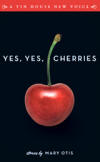Yes, Yes, Cherries
“Beverly puts words in jail. She hunts and traps them, stuffs them into little black boxes. Crosswords.” This quote from the beginning of Mary Otis’ short story “Picture Head” illustrates not only Otis’ skill with language, but also one of the over arcing themes in her first short story collection Yes, Yes, Cherries: the complacent trap we as humans must break out of if we are to live our life happily and completely.
“Beverly puts words in jail. She hunts and traps them, stuffs them into little black boxes. Crosswords.” This quote from the beginning of Mary Otis’ short story “Picture Head” illustrates not only Otis’ skill with language, but also one of the over arcing themes in her first short story collection Yes, Yes, Cherries: the complacent trap we as humans must break out of if we are to live our life happily and completely.
The character Allison, recurring in four of the stories, is a prime example of someone trying to escape the undesirable and boring patterns of her life. Whether she is writing inside her shoes with markers to build up her self-esteem, lamenting her inability to communicate her feelings with her husband, or trying to break away from the expectations of her doting mother and overly dramatic aunt, everything she does radiates the need for her to participate in her life rather than let it live around her passively.
Other lost women in Yes, Yes, Cherries include Brenda, who does not own a watch but is constantly worried about the hours and days of her life slipping away; Julie, a prepubescent young woman who allows a foster brother to touch her intimately because she feels this will make him happy, not because she enjoys it; Molly, a mistress who searches the internet for self-definition; Delia, wants to live only on air because she feels fleshy desires are inherently evil; and Louise, who goes from living with a drug addict to working for the Russian mafia but does not understand why either one is dangerous.
A recurring theme in these stories is the personal consequences, both for good and ill, of illegal, immoral, or inappropriate behavior. Although the narrator never judges the characters, the plots show the progression of how one choice can lead to another: Allison’s teenage desire to be intimate with the married man next door lead her to an unfulfilling life of always choosing the wrong man. Brenda’s imagined relationship to someone she met for five minutes allows her to see how her current relationship would never work. Molly’s boring affair and subsequent friendship with the betrayed wife helps her decide to take control of her own life and leave Henry. And Delia’s bonfire of the contents of her mother’s kitchen shows how an obsession with an unattainable goal destroys a person’s spirit.
One of Otis’ strengths lies in her ability to describe the emotional picture behind a scene, often choosing an unusual metaphor or simile to describe an everyday feeling: Clayton’s childish sense that he would one day be the “Boy with the Most Remembered Things in His Head” because when he thought of a word for exactly four seconds, he never forgot it; how the car that hit Allison’s simply appeared out of nowhere “as if it had popped up from a trapdoor in the road”; and how, when seeing the bonfire in her back yard, Anne was in such deep shock that she could not recognize her neighbors except as “Person Red Scarf, Person Bare Chest, [and] Person White Pants.”
A possible weakness of the stories is their tendency to have an open or unfinished ending. How did the cat, Mr. Teddy die? Did Delia die in the fire? Perhaps, however, it is the author’s intent for her stories to imitate life in the sense that there are no pat endings, and some things are never known. For readers who desire a story with a strong closure, the endings of most of these stories will leave them with an unfulfilled ache.
Yes, Yes, Cherries contains ten short stories, some previously published and two already having won awards. It is a fairly quick read, but must be reread for understanding of some of the deeper subtleties of meaning.





